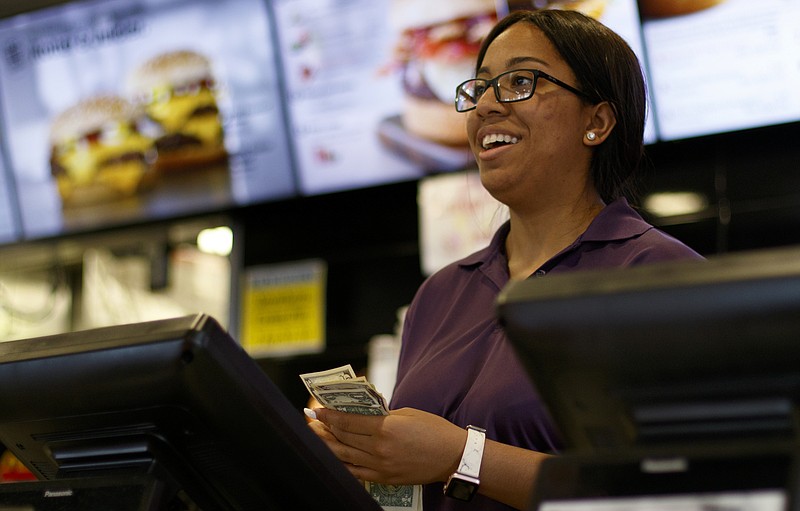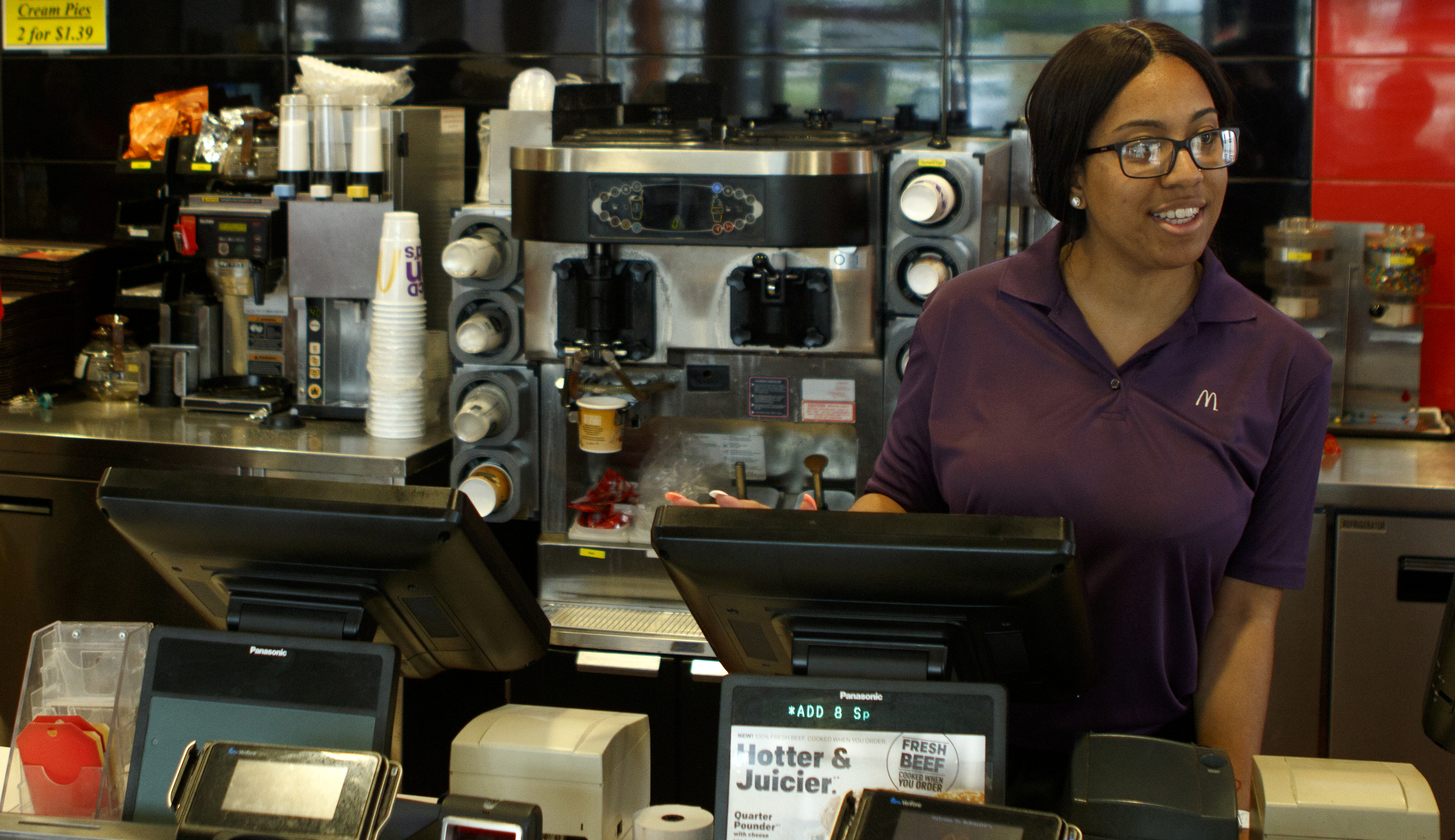School's out and teenagers have a whole summer ahead of them before heading back to classes in the fall.
In their younger years, teens' parents and grandparents might have filled that time with a summer job, but figures show more and more teens are opting out of a paying gig and choosing to spend their summers doing other things. Only about 34 percent of teens, ages 16-19, have participated in the labor force in recent years, according to the Bureau of Labor and Statistics. That is a nearly 24 percentage points drop from the rate in 1979, which was 57.9 percent and the highest rate ever recorded.
Before assuming teenagers are sleeping away their days or just scrolling through Facebook, the bureau reports a contributing factor to the decrease of teens in today's workforce is a higher emphasis on education. While the teen workforce steadily has declined over the past few decades, the number of teens enrolled in school in July jumped from 10.4 percent in 1985 to more than 42 percent in 2016.
Teens increasingly have been involved with classes, camps, volunteering and other activities, and Chattanooga Christian student Matilda Green is one of them.
The 16-year-old St. Elmo resident will spend her summer traveling and volunteering - not behind a cash register. Greene said she will be traveling with her family for several weeks volunteering at her church's vacation Bible school and her school's musical theater camp, and doing a short, unpaid internship in Indianapolis next month.
A middle child, Green said she has never had a paying job while in high school and neither did her older sister, who is now 20. This is the "busiest" summer Green has ever had, she said, but work isn't completely out of the question.
"I'd love to - I think it would be a good experience," she said. "My parents are leaning more toward me graduating high school and just waiting until I'm adult, though. I can preserve a couple years."
This shift in priorities - for both parents and teens - has made recruitment hard for hiring managers in the food service industry, particularly those at quick-service restaurants where teens have traditionally started out at minimum wage or slightly above and make up a majority of the workforce.
Just 25 years ago, there were 56 teenagers for every "limited service" restaurant, or the kind where you order over the counter, according to a New York Times report. Today, there are fewer than half as many, which the paper attributes to fewer workers and an "explosive growth in restaurants."
While less teens are working overall, the labor force participation for teenagers in the summer is generally higher. McDonald's relies heavily on teenagers and young adults, and the company and its independent franchisees plan to hire 8,500 workers in Tennessee alone this summer with many of those workers ages 16-24, company officials said.
Johnathon McGuire, a McDonald's owner and operator in Middle Tennessee, said he noticed a sharp decline in applications about four years ago, shortly after he started working for the company. He said the average McDonald's restaurant has about 60 employees and that number grows closer to 70 during the summer.
"A lot of these teenagers feel like they'll just go to school and college and then go get a high-paying job," McGuire said. "They don't understand a lot of work goes into that. You don't just start out at that. Everybody has to start somewhere."
And while McDonald's has several entry-level positions, McGuire said there are also opportunities for growth and higher wages at the company's franchises. McGuire said half the battle is fighting the stigma that many over-the-counter restaurants face.
"It's not a job that a lot of people in recent history have been proud to have, but that's starting to turn," he said. "We are very proud of our restaurants. We teach people to be clean and safe with food and how to balance nutrition."
To entice more teens and other potential employees to apply, McDonald's rolled out the "Archways to Opportunities" program a few years ago, which offers several programs, including tuition reimbursement for workers. McGuire said there was limited money when it first started, but recently, the company announced it is allocating $150 million over the next five years to the global education program.
Those funds will provide almost 400,000 U.S. employees with an opportunity to earn a high school diploma, receive upfront tuition assistance for college courses, access academic advising courses and learn English as a second language, according to the company.
McDonald's is also lowering eligibility requirements for the program - from nine months to 90 days of employment and dropping weekly shift minimum requirements from 20 to 15 hours. Dropping the eligibility requirements will allow solely summer workers to take part in the program. Eligible McDonald's workers have access to $2,500 a year and eligible managers can get up to $3,000 a year in assistance.
"I feel like some of the kids who have come through our restaurants would not have gone to college at all if we had not had this program to help them pay for it," McGuire said.
Vinceia Crittenden of Chattanooga began working at McDonald's when she was 15 years old. Now 20, she takes advantage of the Archways to Opportunities program and receives $750 a semester in tuition reimbursement.
Crittenden started working at McDonald's because she said she wanted to stop asking her mom for money for things she wanted but didn't necessarily need. She said having a job through high school helped her to "grow up more" and become more of a people person.
"It teaches you how to deal with situations in the real word," she said. "As a kid, you expect to be faced with challenges but you have parents. Working helps you deal with challenges you might have to face when you're out of the house or out on your own."
Low unemployment rates are also yielding fewer job applications for hiring managers. In metropolitan Chattanooga, unemployment rates in April were at the lowest monthly level since the end of 2000. The Tennessee Department of Labor and Workforce Development said the 3 percent rate in the six-county area - and the 2.8 percent rate in Hamilton County - was below both the state average, 3.4 percent, and national average, 3.9 percent.
Krystal, the fast-food chain that operates 364 fast food restaurants across the Southeast, has to fill more than 6,000 jobs a year in what company CEO Paul Macaluso says is the toughest job market in his 27-year career in the industry. The fast food industry averages more than 200 percent turnover - meaning that the typical job has to be filled three times a year - and Krystal historically has had an even higher turnover rate.
"It's extremely challenging - the most challenging labor market for employers I have ever seen," Macaluso said.
But the company has cut its turnover through a number of new initiatives to reward, promote and recognize its employees. Krystal announced it will soon launch a scholarship program for employees to get assistance to attend college. Krystal's parent company, Argonne Capital, is putting $500,000 over the next five years into the new Square Foundation scholarship program to begin offering college scholarships for eligible Krystal employees.
Krystal also recently boosted its pay and began providing free meals for employees while working. Macaluso said higher wages cost the company more money but they have helped to cut turnover costs and kept more jobs filled, which reduces even more costly overtime pay.
"We're doing all we can, first of all, to retain great people by making sure we treat them well and that we are an employer of choice by making sure they are happy and fulfilled by giving them a chance to grow," he said. "Our goal is to have a majority of our managers come from within to create opportunities for them to grow their careers."
The restaurant industry might have to continue getting creative over the next decade as the bureau projects the number of teens participating in the workforce will continue to decline. The rate is projected to drop from 34 percent in 2014 to 26.4 percent by 2024.
While McDonald's and Krystal are using these programs to help recruit teens and other workers, McGuire says he looks at them as more of a retention tool.
"I really preach it to our high-schoolers," McGuire said. "I say, 'I know you came to this job as a summer job, but what I'm telling you is this is the job that could propel you into your future. Take your free money.'"
Contact staff writer Allison Shirk at ashirk@timesfreepress.com, @Allison_Shirk or 423-757-6651.

